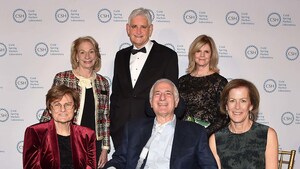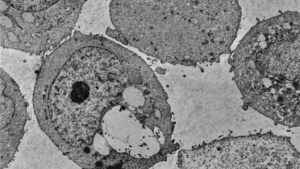Dr. David Tuveson named Director, NCI-Designated Cancer Center at Cold Spring Harbor Laboratory
COLD SPRING HARBOR, N.Y., Nov. 29, 2016 /PRNewswire/ -- David Tuveson, M.D., Ph.D., will succeed Dr. Bruce Stillman as Director of the Cold Spring Harbor Laboratory (CSHL) Cancer Center. Dr. Stillman has served as director of the Laboratory's National Cancer Institute (NCI)-designated Cancer Center for 25 years, shepherding the Center through five highly successful renewals and a overseeing significant expansion. He will continue in his long-standing role as President & CEO of CSHL, as well as maintaining a research laboratory that focuses on DNA replication and genome inheritance.
Dr. Tuveson's research and clinical focus is pancreatic cancer, a lethal malignancy that continues to lack effective clinical solutions. His research at CSHL is making progress toward finding a cure by detecting the disease earlier and designing novel therapeutic approaches, based in part on pancreatic organoid technology that he has pioneered.
"It's a great honor to lead CSHL's Cancer Center and take on the challenge of creating better therapies and better diagnostics by leveraging the Laboratory's unique strengths, which include expertise in developing new methods and technologies that will get us to our goal," Tuveson said.
"Through the use of technologies like 3-D cell cultures – organoids -- and gene editing tools like CRISPR, I believe CSHL will accelerate the drug discovery and development process. I'm very hopeful that five years from now, we should see next-generation therapeutic and diagnostic approaches and we will hear more people saying – 'I used to have cancer,' " Tuveson added.
Tuveson is the Roy J. Zuckerberg Professor of Cancer Research at CSHL, the head of the Lustgarten Foundation Pancreatic Cancer Research Laboratory at CSHL, and is also the Lustgarten Foundation's Director of Research.
The CSHL Cancer Center is one of a handful of the nation's NCI-designated basic cancer centers and for many years has been at the forefront of understanding the molecular and cellular basis of human cancer, using a multi-disciplinary approach to break new ground in tumor biology, as well as developing innovative, advanced technologies.
Dr. Tuveson obtained a bachelor's degree in chemistry at M.I.T. and medical and doctoral degrees at The Johns Hopkins University. He was a medical resident at Brigham and Women's Hospital and a medical oncology fellow at Dana-Farber/Partners Cancer Care. During his postdoctoral years in Boston, Tuveson co-developed KIT inhibitors for gastrointestinal stromal tumors with George Demetri, and created several Kras- dependent mouse cancer models with Tyler Jacks. His lab also generated the first mouse models of ductal pancreatic cancer at the University of Pennsylvania. Subsequently he moved to the University of Cambridge, UK, to develop preclinical and clinical therapeutic strategies for pancreatic cancer. In 2012, Tuveson was recruited back to the US to direct the Cancer Therapeutics Initiative within CSHL's Cancer Center. He continues to practice medical oncology with an adjunct appointment at Memorial Sloan-Kettering Cancer Center and a clinical affiliation at Northwell Health.
Under Dr. Stillman's direction in 2015, CSHL entered into a strategic affiliation with Northwell Health to accelerate the translation of basic research conducted at CSHL's Cancer Center to the clinic. This year, facilitated by the joint appointment of Dr. Robert Maki, MD, PhD, the affiliation established a Cancer Clinical Research Center to enable assessment of new therapies in patients and advance cancer treatment. Every year, the Northwell Health healthcare system cares for more than 16,000 new cancer cases, giving patients access to the services of more than 200 physicians in more than 25 sub-specialties. CSHL research will benefit these cancer patients. As members of the Steering Committee, both Drs. Stillman and Tuveson play key roles in the leadership of the CSHL-Northwell Health affiliation.
Stillman is President and Chief Executive Officer of Cold Spring Harbor Laboratory. He obtained a Bachelor of Science degree with honors at The University of Sydney and a Ph.D. from the John Curtin School of Medical Research at the Australian National University. He then moved to Cold Spring Harbor Laboratory as a Postdoctoral Fellow in 1979 and was promoted to the scientific staff in 1981. Stillman was appointed Director of the CSHL Cancer in 1992. In 1994, he succeeded Dr. James D. Watson as Director of Cold Spring Harbor Laboratory and was appointed President in 2003. Stillman's research focuses on how chromosomes are duplicated in cells, a process that ensures accurate inheritance of genetic material from one generation to the next.
About Cold Spring Harbor Laboratory
Founded in 1890, Cold Spring Harbor Laboratory has shaped contemporary biomedical research and education with programs in cancer, neuroscience, plant biology and quantitative biology. CSHL has been a National Cancer Institute designated cancer center since 1987. For more information, visit www.cshl.edu
Photo - http://photos.prnewswire.com/prnh/20161128/443265
SOURCE Cold Spring Harbor Laboratory
Related Links
WANT YOUR COMPANY'S NEWS FEATURED ON PRNEWSWIRE.COM?
Newsrooms &
Influencers
Digital Media
Outlets
Journalists
Opted In






Share this article